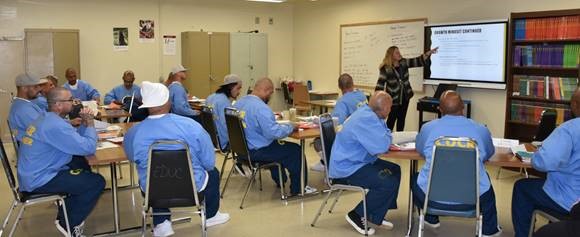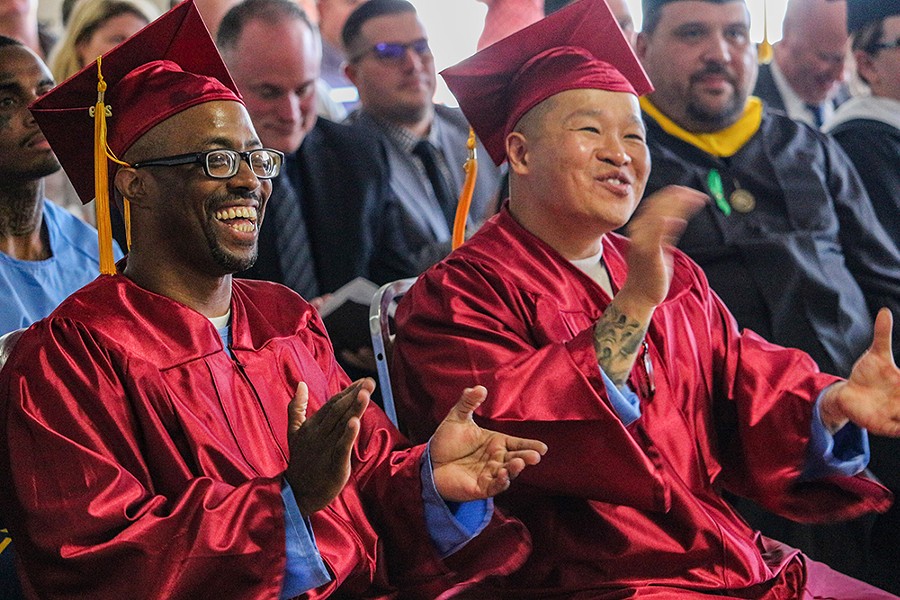Research Behind Bars: The Pelican Bay Scholars Program
By Catherine Cox, College of the Redwoods
College of the Redwoods was one of two colleges awarded the 2020 Exemplary Program Award by the Academic Senate for California Community Colleges, for the Pelican Bay Scholars Program (PBSP). The program, established in 2016, serves incarcerated students at Pelican Bay State Prison and provides a full degree program with face-to-face instruction inside the prison walls. Along with many other student support services, college library staff and faculty play a critical role in supporting the research needs of the students and faculty.

are among the most engaged they have ever taught.
Incarcerated students face significant challenges in completing academic work, and so do the faculty and librarians who support them. Library books may not be sent into the prison, and students in the program do not have access to the internet. Program faculty work closely with the library to design research assignments in a way that allows groups of students the opportunity to use “packets” of background material on the main themes being studied, and then to narrow their focus in different directions by seeking additional research materials. Library instruction is provided through in-person sessions conducted by a college librarian at the prison, to teach students without online access how to focus and narrow their research questions so that they will get the specific information they need. Students complete a form modeled on the web form used for email reference inquiries, and the students’ requests are transmitted to librarians at the Eureka campus, who identify resources from online databases or print resources. Articles and scanned pages are stored in a shared drive for printing by program staff, who deliver the materials to students at the prison.
While most of our library staff do not actually go into the prison to work directly with students, a number of PBSP students have become enthusiastic users of the library resources, and it has been rewarding to watch their research requests become more focused and sophisticated over time. As students work with their instructors and librarians, they learn the importance of defining their needs clearly by articulating what they are trying to accomplish in their assignment and what specific information they need. Their ability to communicate their needs clearly is even more critical than in most reference interactions, since the librarians are not able to ask for clarification from the student and we are trying to respond as quickly as possible so they can have time to work on their projects. Each time materials are returned to the students, they are also sent a “Research Results Form” completed by the librarian which explains the process used to find the materials, lists some of the search terms used, and then gives the results. The intent is to help the student in much the same way we would be explaining what we do while helping a student at the reference desk.

Graduation Day, June 20th, 2019
Our process is evolving each term. Meetings with program faculty have allowed us to identify problems and bottlenecks in the service. One problem that we faced was a matter of timing. Faculty teaching some of the most research-intensive courses, such as English 1A, tended to assign their papers based on the assumption that students would be able to get their first draft back, revise it, and return it two weeks later. However, if the revision required additional research, that schedule did not allow enough time for the student to get additional materials from the library. Once that was identified as a problem, the faculty involved decided to adjust their process slightly so that the final project would be a revision of an assignment from earlier in the semester, allowing more time for additional research. Regular communication between the program instructional faculty and the library is the key to identifying changes of this sort, and is an ongoing process.
In Fall 2019, CR librarians provided nearly 1200 items in response to 145 requests for information. Topics ranged from “environmental racism in California” to “mental health treatment in the Victorian era” to “helicopter parenting” to a request for the President’s proposed 2020 budget. As each student request requires between 2 – 2.5 hours of staff and faculty time, this represents a significant impact on library staff, and we are tracking the use of our services to better gauge staffing and funding needs to support the program moving forward. Later this term we will be surveying the students directly for the first time to gather their input directly, and we are eager to see their suggestions.
You can find out more about the program on Facebook @PelicanBayScholars.